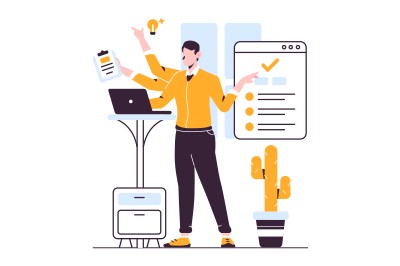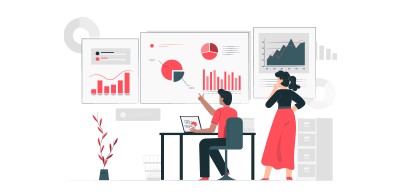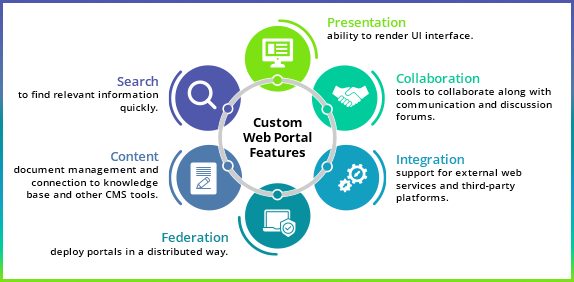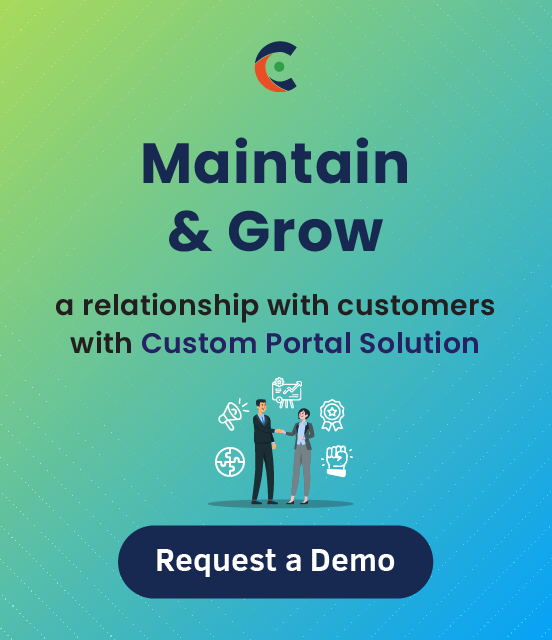By giving them their personal space.
Custom portal development provides that one advantage or a super tool that humans rarely get in the real world. A personalized space where they can be the sole owner of their activities. They can immediately access resources and control how and what they share and with whom. Additionally, they can communicate with others and build strong relations. In short, that one window space makes them the king of their world.
A portal for businesses performs different key roles in sales growth, customer query management, data publication, and multiple services. Though the ways it helps customers/users/businesses differ based on the features and business logic, the primary purpose remains to improve customer service and Streamline business operations.
In this article, we will learn its role in different business logic and CRM functionalities.
That being said, do you think services and operations are the only reasons businesses go for custom portal development?
Let’s find out.
Why Custom Portal Development
It improves communication, decision-making capabilities, and user satisfaction. Most importantly, it resolves the typical set of challenges that businesses face. Let’s see what those challenges are and how custom portal development helps.
Business Challenges
Customer-service staff, account managers, marketers, salespeople, and even you spend most of your time accessing and updating information. That’s the primary task of every business. Hence, it’s essential to have a business system that provides faster access to accurate information.
It may take up a lot of time if you don’t, distracting you and everyone involved from priority tasks. If you have a customer-centric business, it applies to customers too.
These concerns define the benefits of custom portal development – when users can access data instantly, they can accomplish their tasks on time and increase revenue. It also improves their efficiency and productivity. Without a proper system to handle business logic, businesses face a waste of time and resources along with customer dissatisfaction.
Here are the common business challenges that the portal solves.
Constant switching between applications
Often employees have to switch between different applications and CRM to access information or perform an action. It’s especially true for customer support teams who switch between platforms to offer instant answers to customer queries.

Also, it takes up extra time to copy the data manually from one place to another. If any errors occur in it, the team has to spend time resolving those issues.
What the portal does here is – it bridges all the platforms – CRM, ERP, social platforms, etc. and provides a centralized place from where users can access all the data without any hindrance. It allows portal users to access CRM data, manage operations, communicate, and share the details without switching to a CRM or communication platform. Portal users, be it from any industry or any stakeholder, have the freedom to control their information and activities as per the given roles and access rights.
Training new staff and customers

Training applies to all the industries whether it’s teaching new staff about laser machines or a retail customer support staff some soft skills. If you’re doing it manually, it can take up a lot of time and money. After all, you have to plan an entire training session for it.
A custom portal development will free you of it to a certain extent. You can add all the tutorials, videos, and other training materials to help new staff in the knowledge base. The best thing is that they can revisit these materials anytime. It’s not a one-time approach, and this eliminates the chances of errors.
With a knowledge base, you can also guide your customers on how to use a portal. You can share the latest news, updates, and insightful articles, and other content.
Too much data to handle

The biggest drawback of multiple platforms is to remember usernames and passwords. Users can’t remember it, and to simplify their efforts, they start writing and storing their passwords on a piece of paper or local places on their desktop or mobile phones. This compromises security.
So, the portal provides a single-click login option along with security features like role-based access. It means users don’t have to remember their passwords for different platforms. They can access all the platforms with a single login, just like the ‘Sign it with Google’ option.
As that feature frees you from signing up every time on a website, a portal lets you do that with internal channels.
Lack of brand consistency

Coca Cola case study is an example of brand inconsistency.
If your business is spread across oceans and offers various products and services in different regions, maintaining consistency in service and products can be difficult. Your brand should be easily recognizable.
A custom portal helps you maintain that brand all over. Instead of creating different applications and websites for each region’s branding, you can build a unified solution that connects them all, giving a personal touch to every portal user.
Time wasted on outdated information

Working on documents only to realize that it’s not the latest version is frustrating. Users have to work to find the updated content constantly. A similar scenario can be experienced when users update their information in the portal, but it doesn’t sync with the CRM. And worst, if a customer support team can’t reach them or asks them to update the information again.
In such cases, a custom web portal helps with auto-sync features. Every change a user makes in the portal or other application instantly gets updated in the database. Businesses don’t have to worry about managing data or outdated information.
The web portal also provides a document management system for data sharing and storing to avoid security risks.
It also helps with centralized security, collaboration tools, and CRM-specific functionalities like reward systems, managing campaigns, advertising, sales management, etc.
The below section explains how you can use a portal for different industries and their CRM activities.
How to Use Custom Portal Development for Industry-Specific Roles

Depending on the business and portal type, the features may differ. Let’s see a summary of different industries and how the portal helps them:
Nonprofit Organization
Custom portal development for your nonprofit organization can help you streamline nonprofit operations such as donations, volunteers, members, handling tasks, organizing campaigns, managing stakeholders, etc.
It provides standard features like live-chat, self-service, knowledge base, dashboard, calendar, secure access, etc. You can also take advantage of nonprofit-specific features like donation modules, automated fund transfer, fundraising campaigns, event management, volunteers onboarding, timesheet management, member management, etc.
Learn more about Nonprofit Portal
Education Industry
The primary purpose of the portal in the education industry is to have a centralized information-sharing platform with communication capabilities.
Custom portal development will offer a particular set of features to different users. For instance, teachers can manage classes, mark student attendance, plan schedules, arrange timetables, upload information, marks, and other important documents. They can even communicate with students and parents internally via chat platforms.
Similarly, students can view their class schedules, check attendance and marks, submit leaves, and keep up with school notices. Parents can view their child’s details like attendance, marks, performance, leaves, activities, homework, and more.
Admin staff can use the same database and portal to keep fee records, consolidate reports, and view entire school operations.
Learn more about Education Portal
Other Industries
Likewise, the healthcare industry can undergo a custom portal development to manage patients, doctors, and other staff with features like patient information, test results, virtual consultation, insurance settlements, online payments, etc.
The pharma industry can use it to manage drugs and customer details. They can fill customer prescriptions and even connect with doctors to get complete information about patients.
Banking industries can use a finance portal for online transactions, requesting checkbooks, managing loans, and monthly bills.
Real-estate industries can tweak the real-estate portal with industry-specific features such as broker management, seller management, property management, geolocation, media, filters, and document management.
And just like that, other industries like IT, travel, and legal can take advantage of custom portal development with their set of features.
There’s no limit to the type of custom portal you can develop. You can develop a portal for every purpose or user. You can build a customer portal and a knowledge base portal too. Partner portal, employee portal, collaboration portal… just name your reason, and you can have a portal for it.
Benefits of Custom Portal Development
As explained above, a custom portal development covers every business logic and operation with collaboration, integration, and other features. A well-designed solution will help you get better ROI as it will cover all the business challenges.
A custom web portal will:
- Help you save time by consolidating backend processes in a single access.
- Increase security by restricting the data access and offering single sign-in.
- Promote products and brands in a consistent way.
- Streamline business operations with self-service and automation.
- Enable staff, customers, and other users to share documents and collaborate in real-time.
- Enhance customer satisfaction with a huge resource library, communication methods, and better services.
In short, it will make you stress-free from your business problems.
Want to know more about custom portal development?
All product and company names are trademarks™, registered® or copyright© trademarks of their respective holders. Use of them does not imply any affiliation with or endorsement by them.


![How Custom Portal Helps Serve Customers [Applicable To All Industries] How Custom Portal Helps Serve Customers [Applicable To All Industries]](https://www.crmjetty.com/wp-content/uploads/2021/11/How_Custom_Portal_Helps_Serve_Customers_Applicable_To_All_Industries.png)




